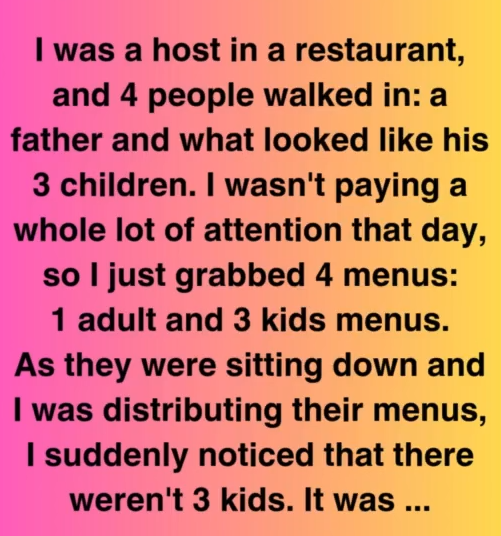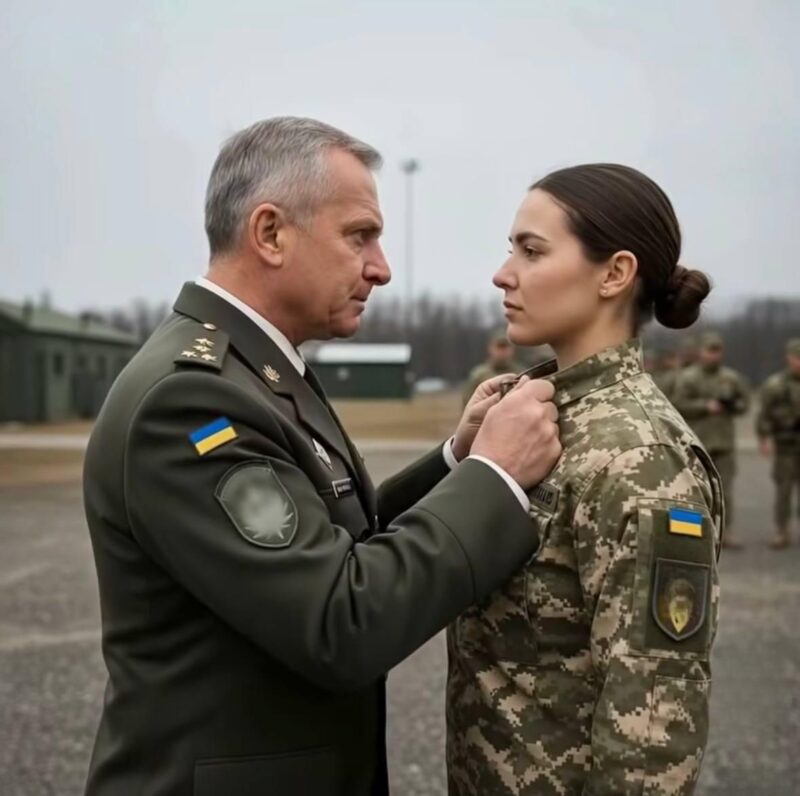I worked as a host at a restaurant when a man came in with what looked like his three children. I wasn’t paying much attention that day and handed out one adult menu and three kids’ menus. But as they sat down, I realized something was off—there were actually two kids and a young woman, probably in her early twenties.
I froze for a moment. Too late—I’d already put a kids’ menu in front of her. She gave me a strange look but didn’t say a word. The father chuckled softly, and I felt my cheeks flush.
“Sorry about that,” I said quickly, reaching to swap her menu.
She waved it off. “It’s fine,” she smiled, but it didn’t quite reach her eyes.
I mumbled something about drinks and stepped back, feeling embarrassed. I couldn’t stop thinking about her face, like she’d been mistaken for younger countless times before—and it probably hurt a little every time.
As the lunch rush picked up, I got busy and stopped thinking about them. We were short-staffed, and I had to help seat guests, refill water, and even take orders.
About half an hour later, I passed their table. The two boys—maybe 9 and 11—were drawing on their menus. The dad was on his phone. The young woman wasn’t eating; she just pushed a piece of grilled chicken around her plate.
I hesitated, then asked, “Is everything okay?”
She looked up. “Yeah. Just not very hungry, I guess.”
Her dad didn’t even look up.
I nodded and walked away, but something felt off.
An hour later, they left. I noticed she’d barely touched her food. The boy beside her had traded his dessert for her salad, and she hadn’t even sipped her lemonade.
The image stayed with me.
A week later, the family returned.
This time, I was more attentive. I gave out two kids’ menus and two adult menus. When I seated them, I made sure to put the adult menu in front of her.
She glanced at me and smiled. “Thanks.”
“No problem,” I said. “Good to see you again.”
Her eyes softened a little, though she didn’t say more.
They sat in the same booth. The dad ordered his usual. The boys were busy with crayons. She again barely ordered anything—just a cup of soup, which she barely touched.
That night, I couldn’t stop thinking about her. It wasn’t just about the menu anymore—it was her silence, her untouched plate, the way she kept to herself.
The third time they came in, I decided to try connecting.
After they ordered, I walked over with a water pitcher.
“How’s school?” I asked the boys. They happily told me about a soccer game and a math test.
Then I turned to her. “And you? Are you in school?”
She blinked. “Me? No. Not anymore.”
I waited, hoping she’d share more.
She didn’t, but as I turned away, she quietly said, “Thanks for asking.”
That was the start.
Over the next weeks, they came every Thursday at 6, same booth, same routine. Gradually, she opened up.
Her name was Liana, 22. The boys were her half-brothers. Her mom died when Liana was 15, and her dad remarried a year later.
She stayed in school and worked part-time, saving for college, but then her stepmom got seriously ill—cancer.
Liana put everything aside to care for her brothers and stepmom. Her dad worked long hours and traveled often.
Eventually, her stepmom passed, and Liana became the main caretaker for her brothers. Her dad was technically around but emotionally distant.
“She’s more of a parent than he is,” one boy joked once.
Liana never complained but always looked exhausted—like her soul was tired.
One night, I overheard her dad telling her to stop wasting time on school.
“You’ve got responsibilities now. Be realistic,” he said.
I wanted to say something but didn’t know what.
Weeks turned into months. I learned she loved reading, cooking, and dreamed of starting a catering business. I encouraged her to start, but she just smiled and said, “Maybe someday.”
Then one Thursday, they didn’t come.
Then the next week. And the next.
I asked around. No one had seen them.
Finally, Liana came back—alone.
She looked thinner and paler.
I hurried over. “You okay?”
She sighed, sitting at the bar. “Dad moved. Took the boys with him. Got a job two states away.”
“And you?”
“He didn’t ask me to come.”
I was speechless.
“I think he wanted a clean break. Said I could visit, but… you know.”
My heart broke.
I brought her tea, on the house.
We sat quietly.
“I feel like I lost everything,” she said. “I raised those boys. They were my life.”
“You didn’t lose them,” I said softly. “They love you. They’ll remember who was there.”
She nodded, eyes watery.
“I don’t know what to do with myself now,” she whispered. “For the first time in years, I don’t have to take care of anyone. And it’s scary.”
I didn’t have answers, but said, “Maybe it’s time to take care of you.”
That night, she left me a folded piece of paper.
A recipe.
At the bottom: “If you ever need catering, let me know. Might as well start somewhere.”
I kept it for months.
One day, we needed a caterer for the restaurant’s anniversary.
I called her.
She was hesitant but agreed.
She cooked everything herself, arrived early, stayed late. Everyone raved about her food.
The owner pulled me aside. “She’s got talent. Think she’d want a regular gig?”
I smiled. “She just needs someone to believe in her.”
She started weekend brunches, private events. Soon, she had a corner on the menu: “Liana’s Kitchen.”
She launched a blog, shared recipes, and soon people booked her for weddings, birthdays, and corporate events.
One day, she came in, glowing.
She found an affordable apartment, bought a used car, and was applying to community college part-time.
“For the first time in years, I’m building something for me,” she said.
Weeks later, two boys stood at the door.
I recognized them.
“Looking for someone?” I asked.
“We’re looking for our sister,” one said.
Liana came out, froze, then ran to hug them.
They’d taken a bus to see her.
“Dad’s always busy,” the older said. “We missed you.”
She cried right there in the restaurant.
They stayed the weekend, then again a month later.
It became a routine.
Liana started Sunday dinners—anyone could join. Staff, neighbors, regulars, and her brothers when they visited.
Food was her healing.
Slowly, she built a life of her own.
Sometimes, I think about the day I gave her the kids menu.
It was a small mistake, but maybe it opened the door to something bigger.
You never know what someone is carrying.
You never know the strength behind silence.
Liana didn’t need saving. She needed to be seen.
She did the rest.
Now, when I pass that booth, I remember how far she’s come.
And that sometimes, the best thing you can do for someone is simply not look away.
If this touched you, share it. You never know who needs to hear it today.




